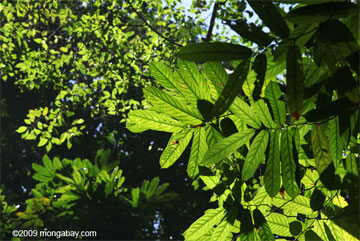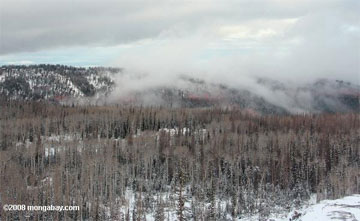Rising temperatures could reverse the role forests play in mitigating climate change, turning them into net sources of greenhouse gases, reports a new assessment by the International Union of Forest Research Organizations (IUFRO).
The report, titled “Adaptation of Forests and People to Climate Change – A Global Assessment” and authored by 35 forestry scientists, examined the potential impacts of climate change across the world’s major forest types as well as the capacity of forest biomes to adapt to climate shifts. Among the conclusions: a 2.5-degree-C rise in temperatures would eliminate the net carbon sequestering function of global forests. Presently forests worldwide capture about a quarter of carbon emissions.
“We normally think of forests as putting the brakes on global warming, but in fact over the next few decades, damage induced by climate change could cause forests to release huge quantities of carbon and create a situation in which they do more to accelerate warming than to slow it down,” said Risto Seppälä, a professor at the Finnish Forest Research Institute and chair of the expert panel that produced the report.
 Tropical forests — and their resident species — are particularly sensitive to small shifts in temperature. |
Climate change, and associated shifts in temperature and precipitation, will have varying effects around the world. Some forests will benefit from warmer conditions, increased rainfall, and carbon dioxide fertilization effects, while others will suffer from increased incidence of drought, fire, and pest outbreaks.
- Under most scenarios, the temperate forests are likely to be less affected than other forest types by climate change. Large regional risks remain, however. Productivity is likely to increase in temperate forests closest to the poles and to decrease in temperate forests bordering the subtropics. Increasingly prevalent storms could cause major disturbances…
Under [emissions] growth scenarios, productivity in some subtropical woodlands could increase due to the fertilizer effect of higher atmospheric CO2 levels but, in other cases, rising temperatures, higher evaporation and lower rainfall could result in lower productivity. Droughts are projected to become more intense and frequent in subtropical and southern temperate forests, especially in the western United States, northern China, southern Europe, the Mediterranean and Australia. These droughts will also increase the prevalence of fire and predispose large areas of forest to pests and pathogens. In the subtropics the trend of increased fire is projected to wane in the latter part of the current century as lower rainfall reduces the availability of grass fuel. The subtropical domain contains many biodiversity hotspots that are at particular risk, even under scenarios stable.
The productivity of tropical forests is projected to increase where water is sufficiently available; in drier tropical areas, however, forests are projected to decline. Tropical forests, particularly rain forests, harbor the highest biodiversity of all land ecosystems; even moderate climate change (such as that projected in unavoidable and stable scenarios) would put some of this biodiversity at a considerable risk.
The report says that these changes will affect ecosystem services and timber production, having social and economic implications.
 Northern forests may benefit from climate change |
“Since climate change is expected to have significant impacts on the capacity of forests to provide vital ecosystem services, it could have far-reaching consequences for the well-being of people living in affected areas,” the report states. “Whether changes in a given region are positive or negative will depend critically on the region-specific nature of climate change: under current projections, forest productivity will rise in some regions and decline in others.”
The report warns that decreased rainfall and increased incidence and severity of drought will put forest-dependent people in Africa at particular risk.
“A decline in forest ecosystem services reduces the ability of forest-dependent people to meet their basic needs for food, clean water and other necessities and can lead to deepening poverty, deteriorating public health and social conflict.”
The assessment also notes detrimental impacts in wealthy countries.
“Regions that, over the next 50 years, are likely to be particularly susceptible to the impacts of climate change on timber production are North America, Europe, Australia and New Zealand.”
Adaptation strategies
The report says that wider application sustainable forest management practices could help temper some impacts of climate change, but cautions that such efforts may only be a temporary reprieve in the face of rising carbon emissions.
“Even if adaptation measures are fully implemented, unmitigated climate change would, during the course of the current century, exceed the adaptive capacity of many forests,” said Professor Andreas Fischlin of the Swiss Federal Institute of Technology, who is one of the lead authors of the study. “The fact remains that the only way to ensure that forests do not suffer unprecedented harm is to achieve large reductions in greenhouse gas emissions.”
Risto Seppälä, Alexander Buck, & Pia Katila (Editors). ADAPTATION OF FORESTS AND PEOPLE TO CLIMATE CHANGE – A Global Assessment Report. Prepared by the Global Forest Expert Panel on Adaptation of Forests to Climate Change. International Union of Forest Research Organizations (IUFRO). World Series Volume 22. April 2009.
Related articles
85% of the Amazon rainforest may be lost due to global warming March 14, 2009
Warming climate could decimate up to 85 percent of the Amazon rainforest by 2150, according to a new computer model. The study, to be published in Nature Geoscience by researchers from the UK Met Office’s Hadley Centre, found that even a 1-degree rise in global temperatures would cause the “irreversible” loss of large tracts of forest. A larger increase could be “devastating” — 75 percent for a 3-°C-rise and 85 percent for a 4-°C-rise.
Drought threatens the Amazon rainforest as a carbon sink March 05, 2009
Drought in the Amazon is imperiling the rainforest ecosystem and global climate, reports new research published in Science. Analyzing the impact of the severe Amazon drought of 2005, a team of 68 researchers across 13 countries and 40 institutions found evidence that rainfall-starved tropical forests lose massive amounts of carbon due to reduced plant growth and dying trees. The 2005 drought — triggered by warming in the tropical North Atlantic rather than el Niño — resulted in a net flux of 5 billion tons of carbon dioxide (CO2) into the atmosphere — more than the combined annual emissions of Japan and Europe — relative to normal years when the Amazon is a net sink for 2 billion tons of CO2.
Boreal forest fires important source of emissions October 31, 2007
Forest fires in the boreal forests of Canada are an important source of greenhouse gas emissions reports a new study published in the journal Nature. University of Wisconsin-Madison forest ecology professor Tom Gower, and colleagues write that fires trigger the release of large amounts of carbon dioxide through mechanisms in addition to burning. The loss of tree canopy following a fire can allow more sunlight to reach the forest floor, leading to increased decomposition and rates of carbon emissions. Warming can melt underlying permafrost, releasing even more stored carbon.
Carbon sinks failing to keep up with emissions October 22, 2007
Atmospheric carbon dioxide (CO2) growth has increased 35 percent faster than expected since 2000, report scientists writing in Proceedings of the National Academy of Sciences. Worryingly, more than half the increase came from a decreased efficiency of natural land and ocean sinks to absorb CO2 from the atmosphere. The reminder came from a slowing in the efficiency of use of fossil fuels.